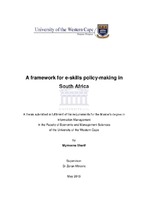A framework for e-skills policy-making in South Africa
Abstract
The development of the Internet and other information and communication technologies (ICT) in recent decades represents a material foundation for a networked society and the emergence of new economies (Knowledge Society) and is now directly affecting individuals and whole societies. ICT is now an indisputable component of addressing the major issues of equity, sustainability and global competitiveness. Being still in its early developmental phase in many developing countries (such as South Africa), Knowledge Society requires profoundly new ways of thinking, working and living, which includes building of new capacities for the entire nation. These capacities are inter alia inevitably associated with the use of ICT and are often referred to as e-skills. These skills broadly described as the ability to develop and use ICT to adequately participate in an environment increasingly dominated by access to electronically enabled information and a well-developed ability to synthesise this into effective and relevant knowledge. In order to address a considerable deficiency in e-skills (estimated shortage of 70000 e-skilled people), the South African government through the Department of Communication has established the e-Skills Institute (e-SI) with the mandate to concentrate on the development of adequate skills to allow its citizens to improve their capacities to use all forms of ICT at work, in their education, in their personal lives and in their governance. In this regard, the e-SI is also responsible for creating appropriate policies which should be linked to other relevant national (e.g. Medium Term Strategic Framework (MTSF), 2009 – 2014) and international (e.g. UN Millennium Development Goals - MDGs) developmental strategies. However, while participating in the development of the current national e-skills policy (the National e-Skills Plan of Action – NeSPA1), the author realised that there were not readily available guidelines or frameworks that could advise policy development in this area. It seems that much space in the policy development is left to the policy-makers own values, experience, expertise, judgement, the influence of lobbyists and pressure groups, pragmatism, or based on the resources available, than on evidence. Thus, this study set the following objectives:
To understand the theoretical and contextual background of policy-making;
To explore existing policy-making frameworks that might be relevant to e-skills policy-making;
To identify and classify e-skills related elements obtained from pertinent literature;
To verify these policy-making elements by interviewing experienced policy-makers in the fields of ICT and e-skills;
To suggest a framework for e-skills policy-making in the South African developmental context; and
To explain the use of the elements within the proposed e-skills policy-making framework.
These objectives were achieved by reviewing the pertinent literature, which led to the construction of the conceptual model for e-skills policy-making in South Africa. This model consists of eight elements: (i) Context-related awareness, (ii) Collaborative e-skills ecology, (iii) Excellence education for all, (iv) Futures of ICT capabilities and knowledge infrastructure, (v) Research and development, (vi) Cost and affordability, (vii) E-inclusion and (viii) Monitoring and evaluation. This model was subsequently empirically tested using the Interpretive hermeneutic research approach by interviewing a number of policy-makers in the fields of e-skills or broader field of ICT policy-making. The empirical findings confirmed validity of the above e-skills policy-making elements but also elicited two new elements: (ix) Integration and systemic approach and (x) Aggregation. Consequently, these elements were assembled together into a framework for e-skills policy-making in South Africa. In order to make the proposed e-skills policy-making framework operational, the next step of this study was to relate this framework to the policy-making processes. This was done by positioning elements of e-skills policy-making framework within the EU "Policy making 3.0" process model. The main contribution of this study is seen in the fact that it brings a novel e-skills policy-making framework particularly design for the South African context but keeping in mind that it can possibly be used in other similar developing countries. Theoretically, this study has added to the academic understanding of significance of certain concepts for e-skills policy-making derived from the pertinent literature but also those identified empirically by this research. Now this study can be used for a practical implementation and also as a base for further academic research. This study also has some limitations mainly seen through a fairly small research sample caused by absence or unavailability of experienced policy-makers. However, it is believed that this limitation did not limit validity of results and the practical and academic contribution of this study.

